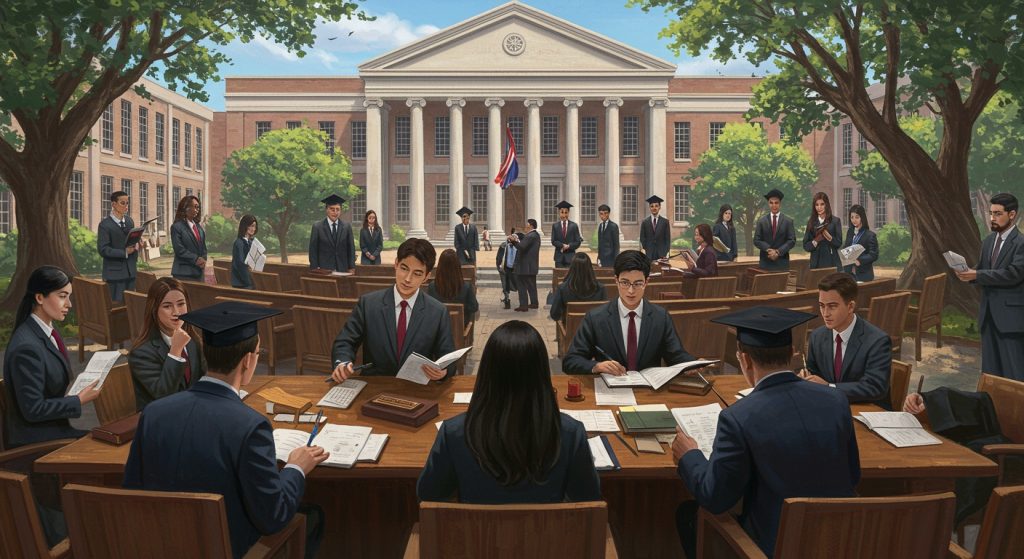Canada’s legal landscape is evolving, demanding lawyers with expertise in navigating complex international frameworks, from trade agreements like CUSMA to human rights laws and environmental protocols. Choosing the right law school is paramount for aspiring international lawyers. This exploration of Canada’s best law schools reveals programs excelling in international law education. We spotlight programs offering specialized courses in international trade, investment arbitration. Transnational criminal law, along with experiential learning opportunities like moot court competitions focused on international disputes and clinical placements with international organizations. Discover the Canadian law schools equipping graduates to tackle global challenges and shape international law’s future.

Understanding International Law: A Primer
International law, at its core, governs the relationships between states and other international actors. It’s a complex web of treaties, customs. General principles recognized by civilized nations. Unlike domestic law, which is enforced by a central government, international law relies on a combination of diplomacy, international pressure, and, in some cases, international courts and tribunals.
- Treaties: Formal agreements between states, binding on those who ratify them. Examples include the Geneva Conventions and the UN Charter.
- Customary International Law: Practices consistently followed by states out of a sense of legal obligation.
- General Principles of Law: Legal principles common to most national legal systems, such as pacta sunt servanda (agreements must be kept).
- Soft Law: Non-binding instruments, such as declarations and resolutions, which can influence state behavior and contribute to the development of customary international law.
Key Areas of International Law
International law encompasses a broad range of subjects, including:
- International Human Rights Law: Protects fundamental rights and freedoms of individuals.
- International Trade Law: Regulates trade between nations, often through agreements like the World Trade Organization (WTO) agreements.
- International Environmental Law: Addresses global environmental challenges, such as climate change and biodiversity loss.
- International Criminal Law: Deals with the most serious crimes of concern to the international community, such as genocide, war crimes. Crimes against humanity.
- Law of the Sea: Governs maritime zones and activities, as codified in the United Nations Convention on the Law of the Sea (UNCLOS).
What to Look for in an International Law Program
When evaluating law schools for international law, consider the following factors:
- Faculty Expertise: Look for professors with strong academic credentials and practical experience in international law. Check their publications and research interests.
- Course Offerings: Ensure the curriculum includes a wide range of international law courses, covering both public and private international law. Consider specialized courses in areas like international trade, human rights, or environmental law.
- Experiential Learning Opportunities: Look for opportunities to gain practical experience through internships, clinics, moot court competitions. Pro bono work.
- Research Centers and Institutes: Some law schools have dedicated research centers focusing on specific areas of international law. These centers can provide valuable resources and opportunities for students.
- International Partnerships: Law schools with strong international partnerships offer opportunities for student exchange programs and collaborative research projects.
- Career Services: A strong career services department can help students find internships and jobs in international law.
Top Canadian Law Schools with Strong International Law Programs
While rankings can fluctuate, several Canadian law schools consistently demonstrate strength in international law:
1. University of Toronto Faculty of Law
The University of Toronto Faculty of Law boasts a renowned faculty with expertise in various areas of international law. They offer a wide range of courses and research opportunities, including:
- The International Human Rights Program
- The Centre for International Governance Innovation (CIGI)
- Moot court competitions focused on international law
2. McGill University Faculty of Law
McGill’s Faculty of Law is known for its unique integrated civil and common law program. Its international law offerings are particularly strong in areas such as:
- International human rights
- International environmental law
- International trade law
McGill also hosts the Centre for Human Rights and Legal Pluralism.
3. University of British Columbia (UBC) Allard School of Law
UBC’s Allard School of Law has a strong focus on Asia-Pacific legal issues, including international trade and investment law. Key features include:
- The Centre for Asian Legal Studies
- Opportunities for internships with international organizations in Asia
- A strong environmental law program with international components
If you are interested in cyber law, check out these Cyber Law Degrees: Affordable Options and Top Programs Unveiled.
4. Osgoode Hall Law School, York University
Osgoode Hall Law School offers a diverse range of international law courses and research opportunities. Strengths include:
- A strong focus on international criminal law
- The Nathanson Centre on Transnational Human Rights, Crime and Security
- A clinical program focused on refugee and immigration law
5. University of Ottawa Faculty of Law
The University of Ottawa’s Faculty of Law, located in the nation’s capital, provides unique opportunities to engage with government agencies and international organizations. Key areas of focus include:
- International trade and investment law
- Human rights law
- Public international law
Career Paths with an International Law Degree
An international law degree can open doors to a variety of career paths:
- International Organizations: Working for organizations like the United Nations, the World Bank, or the International Criminal Court.
- Government: Advising governments on international legal issues.
- Non-Governmental Organizations (NGOs): Advocating for human rights, environmental protection, or other international causes.
- International Law Firms: Representing clients in international transactions, disputes. Regulatory matters.
- Academia: Teaching and researching international law.
Real-World Application: International Trade Law and the WTO
International Trade Law, particularly within the framework of the World Trade Organization (WTO), provides a compelling example of the practical application of international law. The WTO agreements, negotiated and signed by a vast majority of the world’s trading nations, establish the legal ground rules for international commerce.
Use Case: Trade Disputes
Imagine Country A imposes tariffs on steel imports from Country B, arguing that Country B is unfairly subsidizing its steel industry. Country B believes these tariffs violate WTO rules. Here’s how International Trade Law applies:
- Consultation: Country B initiates consultations with Country A under the WTO Dispute Settlement Understanding (DSU). This is the first step, aiming to resolve the dispute amicably.
- Panel Formation: If consultations fail, Country B can request the establishment of a WTO dispute settlement panel. This panel, composed of trade experts, reviews the evidence and legal arguments presented by both countries.
- Panel Ruling: The panel issues a report, determining whether Country A’s tariffs are consistent with WTO agreements. If the panel finds a violation, it recommends that Country A bring its measures into conformity with WTO rules.
- Appellate Review: Either country can appeal the panel’s decision to the WTO Appellate Body, a standing body of legal experts. The Appellate Body can uphold, modify, or reverse the panel’s findings.
- Implementation: If the Appellate Body (or the panel, if there is no appeal) finds a violation, Country A is obligated to implement the recommendations and bring its measures into compliance with WTO rules.
- Retaliation: If Country A fails to implement the recommendations within a reasonable period, Country B may be authorized by the WTO to impose retaliatory measures, such as tariffs on Country A’s exports.
Impact
This process, governed by international trade law, ensures that trade disputes are resolved according to agreed-upon rules, promoting stability and predictability in the international trading system.
Conclusion
The legal landscape is evolving. Canada’s top law schools are preparing graduates to navigate the complexities of international law with increasing sophistication. As you consider your options, remember that mastering foundational legal principles is just the starting point. To truly excel in this field, cultivate strong cross-cultural communication skills and a deep understanding of international relations. Don’t underestimate the power of networking; attend international law conferences and connect with practitioners. I recall a recent conference where a student secured an internship simply by engaging in a thoughtful conversation with a visiting professor. Looking ahead, the demand for experts in international trade law, human rights. Environmental law will only increase. To stay ahead, consider specializing in emerging areas like international cyber law [Cyber Law Degrees: Affordable Options and Top Programs Unveiled](https://biguniversities. In/cyber-law-affordable/). Your journey will require dedication and continuous learning. With the right preparation and mindset, you can make a significant impact on the global stage. Embrace the challenges, seek out opportunities. Believe in your ability to shape a more just and equitable world.
FAQs
So, what makes a Canadian law school ‘the best’ when we’re talking about international law specifically?
Great question! It’s not just about overall rankings. Look for schools with professors who are leading experts in areas like human rights, trade law, or environmental law. Also, programs with strong international law clinics, moot court opportunities. Exchange programs with universities abroad are key indicators.
What kind of courses should I be looking for if I’m dead set on international law?
Beyond the basics like public international law and international organizations, dig into specialized areas that interest you. Think about international criminal law, international economic law, the law of the sea, or even the laws of armed conflict. The more specialized, the better chance you’ll have finding a niche!
Are there any Canadian law schools particularly known for their international law programs?
Definitely! Schools like McGill, the University of Toronto. Osgoode Hall Law School at York University consistently rank high and have robust international law offerings. But don’t sleep on schools like the University of British Columbia or the University of Ottawa – they have great programs too, especially in certain niche areas.
What if I’m interested in combining international law with, say, environmental law or human rights? Are there programs that allow that?
Absolutely! Many schools offer joint programs or allow you to concentrate your studies in a specific area. Look for programs that offer double degrees (like a JD/MA in International Affairs) or have strong interdisciplinary centers focused on things like human rights research or environmental justice.
Besides academics, what else should I consider when choosing a law school for international law?
Think about the school’s location. Being near international organizations or NGOs can open doors to internships and networking opportunities. Also, consider the student body – a diverse student population can enrich your learning experience and expose you to different perspectives.
Okay, I get the schools and the courses. But what kind of jobs can I actually get with an international law focus from a Canadian law school?
Plenty! You could work for international organizations like the UN, government agencies dealing with international affairs, NGOs focused on human rights or development, or even private law firms with international practices. Some graduates also pursue careers in academia or international arbitration.
Is it super competitive to get into these top international law programs?
Yes, it can be! Good grades and a strong LSAT score are crucial, of course. But also highlight any relevant experience you have, like volunteering with human rights organizations, studying abroad, or speaking multiple languages. A compelling personal statement that shows your passion for international law can also make a big difference.



